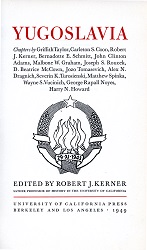Foreign Economic Relations, 1918—1941
Foreign Economic Relations, 1918—1941
Author(s): Jozo Tomasevich
Subject(s): National Economy, Economic history, Interwar Period (1920 - 1939)
Published by: CEEOL Digital Reproductions / Collections
Keywords: Yugoslav Foreign Trade;
Summary/Abstract: Foreign economic relations of Yugoslavia in the period between the First World War and the Second World War were determined by (1) the historical background of the country; (2) its economic structure; (3) its geographic location; and (4) of political conditions in Europe. // Yugoslavia was established through the consolidation of territories which up to 1918 had been parts of several different political and economic entities, on different levels of economic development, and with various centers of economic gravitation (Belgrade for Serbia; Vienna and Budapest for the Yugoslav areas of the Austro-Hungarian Monarchy). The problem was to weld these various parts politically and economically, to reorient them from their former centers of gravitation, and then to integrate the state as a whole into the new European political and economic framework that was being constructed after the First World War. // The economic structure of Yugoslavia was characterized by predominantly agricultural production, increasing agricultural overpopulation, dearth of capital, and lack of entrepreneurial experience. These determined the composition of exports and imports, increased emigration, fostered industrial protectionism, forced the country to import capital, and to rely on foreign services in insurance, trading, and technical and business management.
Book: YUGOSLAVIA
- Page Range: 169-214
- Page Count: 46
- Publication Year: 1949
- Language: English
- Content File-PDF

